surveillance
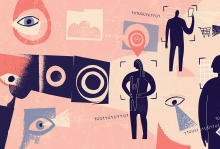
WHEN MY WIFE and I moved into our new house, one of the first things we did was tear out the surveillance system. The Ring cameras, the security keypads, the wires arming windows and doors — all of it. Previous owners, according to neighborhood lore, had run a small meth lab out of a camper on the property (until they caught themselves on fire and burned much of the house down). They survived, but the “all-seeing eyes” of an ADT Smart Alarm did not protect them from themselves.
As we envisioned how our house would become a home, we did not desire the kind of security and protection that depends on surveillance products. More importantly, we wanted to order our lives in a way where true security is based on neighboring — not false security sold by techno-corporations.
In God, Neighbor, Empire, Old Testament scholar Walter Brueggemann identifies three characteristics of ancient and contemporary empires: wealth extraction from the vulnerable to the powerful; policies of commodification in which everything and everyone can be bought and sold; and willingness to use violence “on whatever scale was required” to secure the first two.
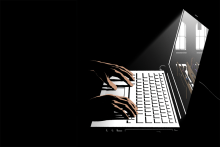
I WAS SITTING in a large auditorium full of market researchers. A speaker suggested that, by selling wrinkle cream, we were helping to make the world a better place because women would feel better about themselves. I looked around the room, thinking, “Is everyone buying into this? Do people really think this is true, or do they see that it’s just a corporate pep talk?”
I had worked in the world of international market research for nearly 10 years. Though there were a few moments like this one when something just didn’t feel right, in many ways I still didn’t see the issues I see so clearly now — marketing techniques are the air we breathe.
I eventually left my work in marketing to pursue a master’s in social justice and a doctorate in theological ethics. I began to investigate how marketing practices negatively impact how we live as human beings and how we think about marketing in the church. In contemporary society, we tend to view marketing techniques as neutral tools that can be applied in different contexts — whether for businesses, nonprofit fundraising, or church communication. But can we adapt tools that have been developed in the context of capitalistic profit maximization to the mission of the church? Are there fundamental differences in how the church views and relates to human beings?
I had worked in the world of international market research for nearly 10 years. Though there were a few moments like this one when something just didn’t feel right, in many ways I still didn’t see the issues I see so clearly now—marketing techniques are the air we breathe.
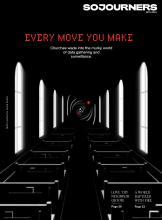
How do marketing techniques, such as surveillance and data gathering, fit with the mission of the church?
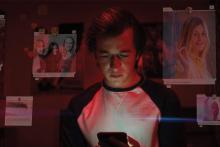
THE PAST DECADE has seen an endless trickle of negative stories about social media—data breaches, Russian bots, cyberbullying, digital radicalization, etc.—so by now almost everyone knows that the amusement and convenience those platforms offer come with a downside. But now a new Netflix documentary, The Social Dilemma, is here to tell us one big thing: It’s worse than we thought. In fact, it’s worse than we could have possibly imagined.
In the film this alarm is raised by many of the very people who helped create the systems they now decry. We’re talking about the guy who invented the “Like” button for Facebook, the guy who designed the recommendation engine for YouTube, the fellow who invented the infinite scroll. One after another these mostly white, mostly male characters come on camera to tell us how badly their proudest accomplishments have gone awry.
The big problem these folks warn us about is that our smartphones constantly collect data (what we buy, what music we play, where we are, who we talk to, etc., ad nauseam) and that data is used to fuel a system of targeted alerts, notifications, and recommendations designed to keep us on a site for as long as possible and deliver us to advertisers who also have that data about us.
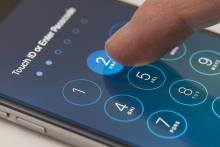
There are two things that make this order very dangerous, Opsahl said. The first is the question it raises about who can make this type of demand. If the U.S. government can force Apple to do this, why can't the Chinese or Russian governments? The second is that while the government is requesting a program to allow it to break into this one, specific iPhone, once the program is created it will essentially be a master key.

In 1990, my father and pregnant mother packed up their life in suburban Illinois, bundled their four young children (including me) onto a plane, and landed in Romania to teach on a grant at the University of Bucharest.
The country was in the throes of revolution following the execution of ousted dictator Nicolae Ceaușescu, and the transfer of power was by no means tidy or complete. The Securitate — one of the most brutal secret police forces in the world — proved difficult to shut down. All our neighbors operated under the assumption that their every move continued to be watched (one friend had taken apart his typewriter by hand and hid it so he could answer honestly that he did not keep a typewriter in the house). Being American, my parents were told to expect our apartment to be bugged.
Freedom had come, but the systems of omnipresent control proved psychologically hard to shake.
The specter of surveillance is an insidious tool. In the 1790s, British philosoper Jeremy Bentham developed a centralized prison model called the panopticon, in which every occupant is visible to a single guard. Most models, since adapted by prisons and schools around the world, leave open the possibility that there is no supervisor watching after all. Whether there is isn't the point — the mere promise of one is enough to coerce significant behavior change. Being constantly observable is the trap.
These days, Americans don’t need a formative year spent in post-soviet Romania to feel uneasy about omnipresent surveillance. Edward Snowden’s revelations of massive secret surveillance programs operating under the NSA, with enormous access to private data from citizens not suspected of terrorism or criminal wrongdoing, rocked our understandings of data privacy and civil liberty. Now, as then, it’s reasonable to worry that we’re being watched.

Muslim and civil rights groups welcomed the news that the New York City Police Department’s Demographics Unit will disband but said they still fear they may be targets of warrantless surveillance.
Muslim Advocates filed a lawsuit in 2012 to stop the program, and the group was later joined by the Center for Constitutional Rights.
“We need to hear from the mayor and NYPD officials that the policy itself has been ended and that the department will no longer apply mass surveillance or other forms of biased and predatory policing to any faith-based community,” said Ryan Mahoney, president of another Muslim civil rights group, the New York chapter of the Council on American-Islamic Relations.
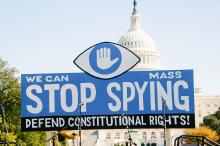
I was encouraged by the findings of U.S. District Court Judge Richard Leon on Monday who granted an injunction to plaintiffs Larry Klayman and Charles Strange that will temporarily stop the National Security Agency from continuing their data-gathering program that mines information from our mobile phone calls.
The injunction was issued because the judge believes that Klayman and Strange likely will win their lawsuit against the federal government, claiming that the phone record collection practice is an unconstitutional violation of personal privacy.
The whole storyline is made that much more dramatic since the otherwise secret program was leaked to the public by former NSA contract Edward Snowden, who is now on the run, seeking asylum in exchange for shared intelligence. And while some perceive Snowden as a hero of individual liberty, others vilify him as an enemy of the United States, much like any other terrorist. Interestingly, people’s opinions about the NSA — and, frankly, the Obama administration and the government as a whole — diverge in similar ways.
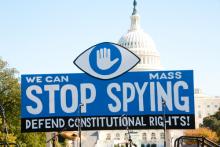
As if it wasn’t chilling enough to learn that NSA cronies are poring over your web browser history, now we discover that Barack Obama sits in bed at night and listens in on German Chancellor Angela Merkel’s cell phone calls to Domino’s.
Okay, maybe those are a bit of a stretch, but quite a buzz has been generated as of late about the revelation that the United States does, indeed, monitor the communications of leaders from allied nations, including the cell phone activity of Chancellor Merkel. For some, the collective reaction has been more of a collective shrug, as if such impositions should be expected from a global superpower that generally prefers to maintain that status. But for others, there’s a clear sense of shock and outrage.
For starters, let's clarify: nations cannot be friends.

A coalition of 125 religious, civil rights, and community-based organizations sent a letter to the U.S. Department of Justice Thursday urging a civil rights investigation into a New York City Police Department program that spies on Muslims.
Groups from several faith traditions signed the letter including the Presbyterian Church (USA), the National Council of Jewish Women, the Hindu American Foundation, and the Sikh Coalition. Civil rights groups include the Leadership Conference on Civil and Human Rights, the NAACP, the American Civil Liberties Union, South Asian Americans Leading Together, and the National Network for Arab American Communities.
The NYPD program is already the target of two federal lawsuits, one filed in June by the ACLU and the City University of New York Law School’s Center for Law Enforcement Accountability and Responsibility, and the other filed in June 2012, by several Muslim plaintiffs represented by Muslim Advocates and the law firm Bhalla and Cho.

SINCE WE NOW know the federal government has been monitoring our every move for years—recording our telephone calls, reading our emails, trying to friend us on Facebook (“you have 295,984,457 mutual friends!”)—I wanted to clarify a few personal remarks that may have been misconstrued by NSA computers; computers which, I might add, are doing a heckuva job.
When I emailed a friend that I thought I “killed” at a recent gathering, I meant that I was particularly amusing that evening. I was not bragging about some heinous crime, which I would never commit anyway because, frankly, that’s not where the laughs are.
But “killed” looks bad in cyberspace, even though it’s something comedians want to do, as opposed to “bombed,” which is the opposite of “killed,” although NSA computers probably recognize a certain similarity between the two and automatically alert law enforcement officials. But again, the word “bombed” is a comedy concept meaning, variously, “wishing you were dead as an audience sits silently in judgment,” or for me, who entertains mainly in the homes of friends, “wishing you were dead, because people are laughing about you in the kitchen.”
But living in a free society means we shouldn’t have to watch what we say to avoid the unwanted curiosity of federal authorities. Heck, I get into enough trouble just trying to cheer up taciturn gatherings. (“Hey, is this a party or a funeral, hah hah?! What? Oh, sorry, I didn’t notice the flowers. Yes, he’ll be missed.”) On second thought, maybe a few days of secret CIA interrogation might do me some good. (“Were you under instructions from al Qaeda when you embarrassed your host by juggling the dinner rolls? Are there other social events you plan to terrorize or disrupt in the near future?”)
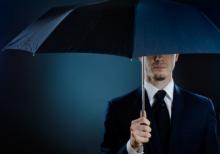
After denials and evasions, we learned that two successive administrations lied to the American public about unprecedented spying on ordinary citizens.
The latest phase of this longtime spying effort began shortly after 9/11 and accelerated steadily, as the government used existing laws and newly passed laws to demand access to supposedly private information, such as cell phone call logs and email data.
It might have begun as an effort to track foreign terrorists as they interacted with allies in the U.S. and visited the U.S. But it spun out of control as the National Security Agency decided it needed to spy on all citizens.
On Jan. 25, 2011, Jacob Flowers left work early to get to a meeting. The organization where Flowers serves as executive director, Mid-South Peace and Justice Center, has been involved in community organizing since 1982. Although not officially affiliated with any religious body, the Center works closely with the faith community and is housed in a large building owned by First Congregational Church, a United Church of Christ community in Memphis.
While a snowstorm swirled outside, Mid-South’s organizing director, Brad Watkins, presided over an afternoon workshop in which anyone who was interested could come in and complete Freedom of Information Act requests about FBI surveillance. Activists decided that a FOIA-themed workshop would be a good way to stand in solidarity with anti-war and pro-Palestinian activists in the Midwest whose homes had been raided by the FBI the year before. Since the workshop attracted only a modest crowd of peace activists, nothing could have been more alarming than the arrival of three unexpected guests—black-clad agents from the FBI’s Joint Terrorism Task Force.
“We suspected that they found a way to get into the building,” Flowers recalled in an interview, “because normally the building is locked up pretty tight.” The FBI agents explained that they were there to warn the owners of the property of an impending protest. Watkins informed them that it was a workshop, not a protest, and that they were currently looking at the people responsible for organizing it. As soon as Watkins began asking if they were trying to harass citizens concerned about FBI repression, the agents quickly left.
Flowers returned to Mid-South’s offices around 3 p.m. to discover nearly a dozen police vehicles on the block surrounding the church and patrolling First Congregational’s parking lot. He also noticed that a black SUV with tinted windows was idling across the street from the church—one of five such vehicles on the scene. Phone calls to the Memphis Police Department (MPD) determined that the department had learned of a planned protest and had sent officers to “keep the peace.” Someone at the local FBI office told Flowers that the only FBI agents on the scene that day had been the three who entered the offices.

After lobbying from Muslim and Sikh leaders, the Los Angeles Police Department has agreed to modify its information-gathering program on suspicious activities after the New York Police Department came under fire for spying on local Muslims.
Since 2008, the LAPD has used the federal Suspicious Activities Reporting (SAR) program to file reports on potential terrorist-related actions, such as someone photographing certain buildings. Sikh and Muslim leaders said the LAPD’s Counter-Terrorism and Criminal Intelligence Bureau should ensure that future suspicious activity reports are prompted by actual behavior with apparently genuine criminal or terrorist elements.
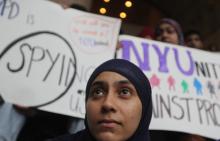
NEWARK, N.J. — As friction over the New York Police Department's spying on New Jersey Muslims continues to grow, the state's top FBI officer said the uproar is damaging his agency's ability to gather important counterterrorism intelligence.
"What we have now is (Muslim communities) ... that they're not sure they trust law enforcement in general, they're fearing being watched, they're starting to withdraw their activities," Michael Ward, director of the FBI's Newark division, said Tuesday (March 6).
"And the impact of that sinking tide of cooperation means that we don't have our finger on the pulse of what's going on in the community as well -- we're less knowledgeable, we have blind spots, and there's more risk."
In his first public comments on the deepening controversy, Ward said the FBI has spent the years after 9/11 opening lines of communication with New Jersey's Muslim communities.